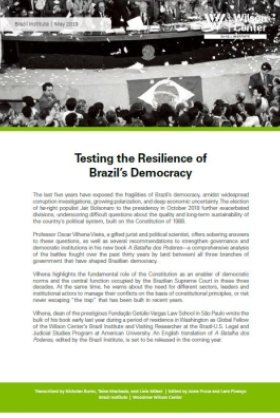Event Summary: Testing the Resilience of Brazil's Democracy


The last five years have exposed the fragilities of Brazil’s democracy, amidst widespread corruption investigations, growing polarization, and deep economic uncertainty. The election of far-right populist Jair Bolsonaro to the presidency in October 2018 further exacerbated divisions, underscoring difficult questions about the quality and long-term sustainability of the country’s political system, built on the Constitution of 1988.
Professor Oscar Vilhena Vieira, a gifted jurist and political scientist, offers sobering answers to these questions, as well as several recommendations to strengthen governance and democratic institutions in his new book A Batalha dos Poderes—a comprehensive analysis of the battles fought over the past thirty years by (and between) all three branches of government that have shaped Brazilian democracy.
Vilhena highlights the fundamental role of the Constitution as an enabler of democratic norms and the central function occupied by the Brazilian Supreme Court in these three decades. At the same time, he warns about the need for different sectors, leaders and institutional actors to manage their conflicts on the basis of constitutional principles, or risk never escaping “the trap” that has been built in recent years.
Author
Contributor

Dean, Getulio Vargas Foundation Law School (FGV Direito SP)

Brazil Institute
The Brazil Institute—the only country-specific policy institution focused on Brazil in Washington—aims to deepen understanding of Brazil’s complex landscape and strengthen relations between Brazilian and US institutions across all sectors. Read more





